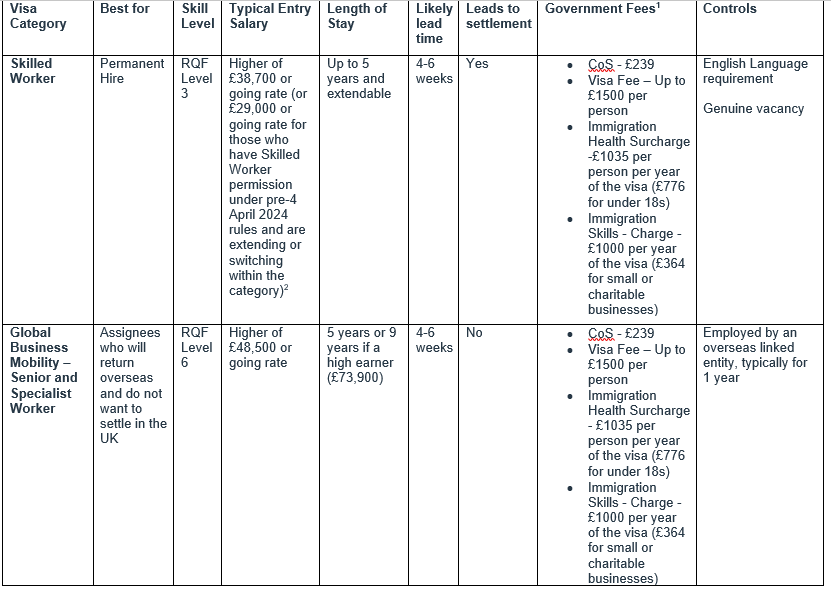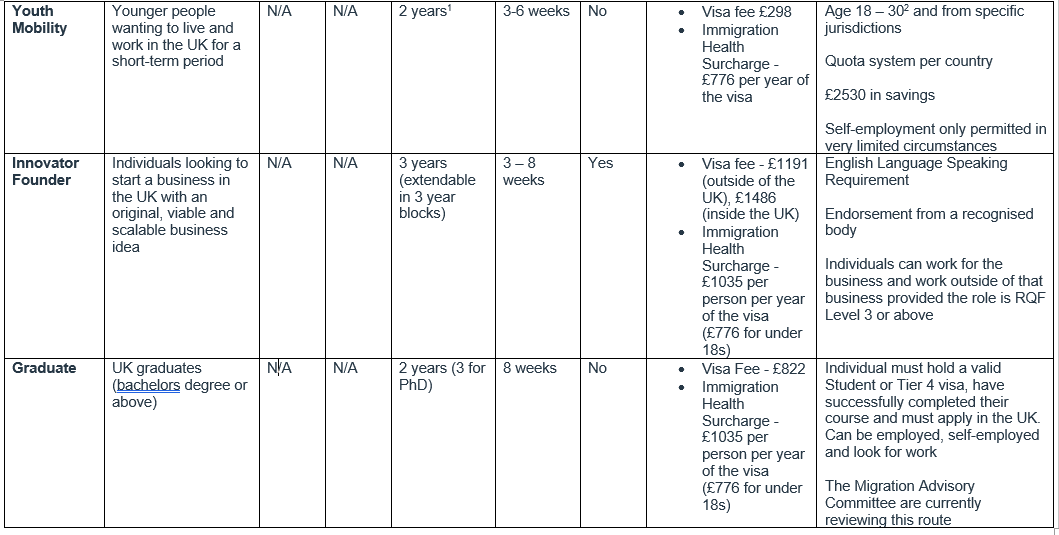A Guide to Immigration Options for Workers in the UK
This year has seen significant changes to the UK immigration system as the government seeks to reduce the net migration figure by increasing salary thresholds in the work and family routes, restricting access to dependants of certain categories, and raising fees across the board. However, the overall architecture of the UK immigration system remains as established post-Brexit, which, despite its costs, is well used and world renowned for its transparency, operational efficiency and moves towards complete digitisation. This guide gives a high-level overview of options under that system that enable London and the wider UK economy to access overseas workers across a range of skills and talents. Those options are divided in general between ‘employer-sponsored’ and ‘non-sponsored’ routes.
‘Employer-sponsored’ routes are those where government-licenced employers can recruit overseas workers by offering such workers ‘sponsorship’ so long as employers comply with their sponsor licence duties. Sponsorship can only be offered to workers when certain personal and employment conditions are met. Such conditions vary according to the route under which sponsorship is offered. The Skilled Worker or Senior or Specialist Worker (Global Business Mobility) are perhaps the most straightforward and commonly used of the employer-sponsored routes, although their cost may be seen as prohibitive for some businesses.
In contrast, ‘non-sponsored’ routes are those allowing overseas workers to come to the UK to work without the need for sponsorship by any specific employer, but instead by reference only to the overseas worker’s personal attributes. Examples include the Youth Mobility Scheme and the High Potential Individual Route.
Please keep in mind that this guide is not intended to cover every UK immigration route or the range of nuanced considerations that apply to different visa types. For more comprehensive and bespoke advice as to the most appropriate route to pursue for the recruitment/employment proposed, which can take more precise account of individual circumstances and sector considerations, please contact Fragomen, whose details appear below.
Fragomen
Established in 1951, Fragomen is a leading firm dedicated exclusively to immigration services worldwide. The firm has more than 4,900 professionals and staff—including more than 680 lawyers and equivalent professionals—in more than 55 offices located in the Americas, Asia Pacific and EMEA. In total, Fragomen offers support in more than 170 countries. Fragomen’s professionals are respected thought leaders in the immigration field, as recognised year after year by Chambers, Best Lawyers and Who’s Who. Should you require any support with your immigration needs, Fragomen are available to advise on any of the options mentioned here and more.
Contact Us
Please contact Louise Haycock by email.
Employer-Sponsored Visas
Overview:
The most common employer-sponsored visa in the UK is the Skilled Worker visa. Employers with a sponsor licence may use the Skilled Worker category to recruit individuals to work in the UK in a specific job. Employers may also have the option of sponsoring under the Senior or Specialist Worker (Global Business Mobility) route which is specifically designed for existing employees coming to the UK on temporary assignments. There are further sponsorship categories under the Global Business Mobility route but these are outside the scope of this guide.
What Does It Mean to Be A Sponsor?
To sponsor someone in the UK, the employer must hold a sponsor licence, issued by the Home Office. Sponsors can issue individuals with a Certificate of Sponsorship for a specific role within the business which must meet a set skill and salary level requirement. As a holder of a licence, the employer takes on record keeping and reporting obligations in relation to those individuals that it sponsors and must ensure that it has the necessary processes and procedures in place to meet this requirement.
Applying for a UK Sponsor Licence
To obtain a sponsor licence, a company must file an application with the Home Office. Before doing so, they should ensure that the business can comply with the record keeping and reporting obligations in relation to those individuals that it sponsors and document the necessary processes and procedures in place to meet this requirement.
A company can qualify for a licence provided it is legally operating and trading in the UK and can provide prescribed documentation to evidence this. The Home Office will also require suitable UK employees to take up key roles under the licence to ensure compliance.
Applications generally take 6-8 weeks to be decided but can be expedited for an additional fee.
Options once the company holds a Sponsor Licence
- As a Sponsor, the company can issue COSs to individuals for a specified role provided the role is listed as eligible and meets minimum salary requirements. Applicants can only be sponsored under work routes to do jobs in an eligible occupation, as identified by a SOC Code.
- To secure requisite points for salary, a worker must be paid whichever is the higher of
- the minimum ‘general’ salary threshold applied for the route under which an application is made or
- the ‘going rate’ for the occupation in question.
- The ‘general’ salary threshold is based on the earnings data relating to all eligible occupations under a route. The ‘going rate’ is based on the earnings data relating to a specific occupation.
- General thresholds and going rates are based on Office for National Statistics (ONS) Annual Survey of Household Earnings (ASHE) pay data.
- Eligible SOC codes and going rates that apply to them across routes in various circumstances are set out in Appendix Skilled Occupations.



2 Discounts are available for the Health and Care visa, New Entrants, roles on the Immigration Salary Discount List and those with PhDs relevant to the role.
Non-Sponsored Visa Routes
There are also a raft of other visa types which do not require sponsorship and will provide an ability to work in the UK. Below is a non-exhaustive list:


Points to note
TB Testing
If an individual has lived in a country on the Tuberculosis (‘TB’) list in the 6 months prior to their application, they must provide a valid medical certificate to show they are free of TB with their visa application. Find the list of TB countries.
English Language Requirement
As identified above, many visa applications require evidence that the individual meets the English Language requirement which they can typically do by:
- Being a national of a majority English language speaking country;
- Having a degree taught in English; or
- Taking an approved English Language Test
Bringing family members
Each of the above categories (apart from Youth Mobility) can bring dependants (dependants of those in the Graduate category can apply to extend if they had dependant status based on the main applicant’s Student and Tier 4 status). This includes spouses, civil partners and those in a long term committed relationship and dependants under the age of 18. Additional fees will apply per person.
This guide has been produced by LCCI member Fragomen.


